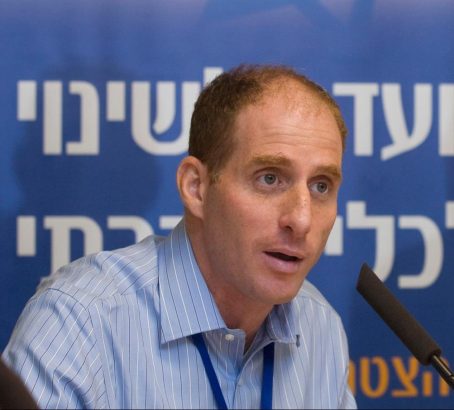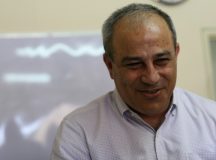The Israeli government has approved an ambitious $3.85 billion plan for the social and employment development of Israel’s Arab citizens. Ron Gerlitz, the co-executive director of Sikkuy: the Association for the Advancement of Civic Equality, explains how and why the plan was passed and why it is a historic move that shows it is possible to transform Israel into a more just society.
Why this decision is so important
The main reason is that the core of this decision is an adjustment to public budgeting mechanisms. This is not a decision that increases a particular budget to close gaps temporarily, on a one-time basis. Rather, this decision determines that 20 different budget mechanisms, some of which are significant, will allocate budgets to Arab citizens according to their proportion in the overall population. These include budget mechanisms in fields such as infrastructure, employment and industry, transportation, some components of the educational budget, housing and others. In addition, affirmative action – of up to 30 per cent – will be taken in order to compensate for the discrimination that has existed until now.
Out of all of the investments in infrastructure in Israel (with the exception of metropolitan areas) the government will allocate 40 per cent for road infrastructure development in Arab communities; 20 per cent of the informal education budget will be allocated to Arab citizens (to be precise, according to their total number in the population); at least 25 per cent of the construction budget for new day care centres will be allocated to Arab communities; 42.5 per cent of the budget for industrial parks will be allocated to industrial parks that yields income to Arab communities; and 40 per cent of the budget of the Ministry for Development of the Negev and the Galilee Periphery will be allocated to the Arab society; and there are many other examples.
The process of correcting budgetary mechanisms is the high road towards equality. Merely increasing external funds that barely close any gaps, while the regular budget mechanism continues to discriminate, and even leads to more discrimination, is simply not the way to end unequal budgeting.
How much money is being allocated?
It depends on how you count. However, there are two billion NIS (about 500 million USD) that will go almost directly to Arab local authorities. But this is only the small money. The larger amount is the budget that will be allocated to Arab communities following the correction of the budget mechanisms. This is about 10 billion NIS ($2.5 billion dollars). The Ministry of Finance claims that there’s more than that, and in total there are at least 12 billion NIS. This is a very significant amount. Knesset member Ayman Odeh wrote that the plan will close one-sixth of the gaps between the Jewish and Arab citizens. In my opinion this is a pessimistic interpretation, and I believe it will close more than one-third of the gaps.
Is the plan perfect?
No. There are fields of budgetary discrimination that are not addressed at all. The most critical being the failure to correct the budgetary discrimination against Arab high schools, which is not included in the decision. Overall, the plan does not adequately deal with the financial distress from which Arab local municipalities suffer. We at Sikkuy argued endlessly with the Ministry of Finance about this. The Association of Arab Local Authorities insisted on this, Knesset members intervened and there was a huge argument on the subject. In the end, the Ministry of Finance allocated some money; but not enough. In this specific matter, I believe the Ministry of Finance is totally wrong. I hope that the Arab leadership will continue its struggle on that issue.
So are there more advantages or disadvantages in the plan?
It depends if you want to the see the cup as 80 per cent full, or 20 per cent empty. I know that the right-wing ministers of the Likud were much less ambivalent. When they figured that this plan was to bring billions of shekels to the Arab citizens, they went on a rampage the entire week, in an attempt to halt the plan. They would not have fought against this if this was just a five-year plan that allocated a few hundreds of millions of shekels to the Arab citizens. I cannot remember a single time that the government convened twice in the middle of the week for unscheduled meetings besides during times of war. And last week was indeed a war – because it was clear to them this decision meant billions for the Arabs.
Why has the government made this historic decision?
The main reason is that in the last two years, the Budget Division within the Ministry of Finance came to the deep understanding that the Israeli economy would be badly damaged if Arabs are not integrated in the workforce. For years, people have spoken about this, and all of the economists have presented their graphs which show a bleak economic future without Arabs being incorporated to the Israeli economy.
However – and this I say with full responsibility and with a deep acquaintance with the senior officials in the Budget Division, and following many conversations with them – this theoretical understanding among the professional staff in the Budget Division was transformed to a feeling of urgency, almost panic about the fate of Israel’s economy if Arabs are not to be a part of it. They also understand that in order for integration to occur, they are obliged to close the gaps in education (from kindergarten to university), infrastructure, transportation and more fields.
This feeling of panic ignited the most impressive staff work ever seen in government ministries, in order to construct a coherent plan to close the gaps between the Jewish and Arab citizens. The plan was designed by the programme officers in the Budget Division of the Ministry of Finance and the Authority for Economic Development for the Arab Citizens (led by Aiman Saif). I have no idea which party the staff in the Budget Division voted for in the last elections. Certainly not all of them voted for Meretz or the Joint List. However, they have a perspective that was very non-racist toward Arabs, what I call ‘deep non-racism’.
The combination of their understanding of what was at stake for the economy and their deep non-racism pushed them to work day and night in order to promote the plan. Our conversations with them in which we pressured them to add things into the plan frequently took place at 10:00 at night.
At a certain point, they mobilised Minister of Finance Kahlon. However, when it became clear that there was a major opposition to the plan among some of the ministers and ministries, it was necessary to shift Kahlon from simply supporting the plan, to having him fight for it. I assume that Amir Levy, the head of the Budget Division, and Aiman Saif pressured him very hard. Then Knesset member Odeh came into the picture. In a way that I cannot understand, he succeeded in causing Kahlon to put his word and his personal commitment to passing the plan by the end of the year on the line. This was the watershed moment.
The Authority for Economic Development for Arab Citizens, led by Aiman Saif also played a crucial role. Their knowledge of the Arab society and of the barriers to equality had a positive influence on the process. The transfer of the Authority from the Prime Minister’s Office to the Ministry for Social Equality was initially perceived as negative. However, the bottom line was that Minister Gila Gamliel put all of her power and influence toward passing the plan.
In addition, the Union of Arab Local Authorities in cooperation with some of the Arab Knesset members, conducted a very difficult and exhausting, but nonetheless, ultimately effective negotiation with the Ministry of Finance. They succeeded in improving the plan and adding budgets. Despite the frustration from both sides in the negotiation, they both wanted an agreement, and this heightened the motivation of the Ministry.
Why did Netanyahu support the plan?
I have no idea. For sure, he understands the economic imperative for integrating the Arab citizens in the employment market. But he leads an extreme right wing government with many ministers who have an anti-Arab agenda and hence he certainly was not enthusiastic. If it only depended on him, this would not have passed, in my assessment. When Netanyahu saw Kahlon was ready to kill himself over this, he decided to let it pass and take advantage of it in order to create some positive PR with the world and to show the world how good he is for the Arabs.
In the recent days we heard statements from some extreme right wing ministers that there will be set of conditions for the implementation of this plan and that ministers’ committee will be responsible to define these conditions. We then heard a clear denial of these claims from the Prime Minister’s office itself! And very senior officials in the Ministry of Finance told us that there is nothing behind the statement of the ministers and that the government. decision is final and now they are moving to implementation.
It is very bad that extreme right wing ministers have to do ‘damage control’ with their voters for approving a plan which transfers billions of shekels to the Arab citizens and begins closing the gaps. It shows that in Israel, and even inside the government itself, there are contradictory forces and a real struggle between those that push for equality and shared society and those that try to block progress.
Will the plan be implemented?
I am not a fortune teller, but I am an expert in these matters. The chances for its implementation are high because of the following reasons:
• The government and the state have a deep economic interest in promoting the integration of Arabs into the economy, and it’s clear that without closing the gaps between Jews and Arabs this won’t happen. Pure and simple. This is a structural issue, not a personal issue. Interests are the key factors that have an influence on economic policy.
• The plan does not require a change in the state budget. This is a matter of budget allocation within the existing budget. For example, the infrastructure budget does not need to grow; it only means a large portion of it will finally go to the Arab citizens of Israel. There is not a single new shekel in the infrastructure budget. However, hundreds of millions of shekels will be transferred to Arab citizens.
• The Budget Division is the strongest department among the various government offices and they are the ones promoting and advancing this plan. People say that the officials in this Division are even stronger than the ministers. This is partially an exaggeration and partially true. The fact is, we are talking about a government decision that the Budget Division went all the way to implement. That combination dramatically increases its chances of being implemented.
Yes, some of the ministers and the ministries did not want the plan, but they are bound by a government decision that is not dependent on their good will. When government ministries do not implement reforms that the Budget Division is interested in, the Division retaliates back by not authorising funding for things that they want, in some circumstances even to the point that the ministers will implement a plan even when it goes against their will.
• There are very strong Arab forces that will be monitoring the plan’s implementation. The political representation of the Arab citizens has never been as large or as strong as it is now. The Knesset members from the Joint List are a strong force that will act, and will not remain silent if and when elements of the plan are not implemented. There are also strong Arab and joined Arab-Jewish civil society organisations that will stand watch. The lawyers from Adalah will submit appeals against the government ministries that do not implement their share; the Arab Center for Alternative Planning will work on the issue of planning and construction; Injaz will work with the Arab Local Authorities, and Sikkuy will certainly invest a great deal of resources and will not cease working until government ministries implement the decision.
How much of the plan will be implemented?
In my assessment up between 70 and 80 per cent of the decision will be implemented within five years. There are some sections of the plan that are very hard to implement and there are some ministers and some ministries that are more rebellious.
Despair is not a programme
I think that some ridiculous statements have been made about the plan. For example, that ‘previous government decisions in regard to the Arab citizens have not been implemented.’ But if we look at all the decisions in favour of economic development for the Arab citizens of the past years, that is simply not true. In fact, between 80 and 95 per cent of the budgets have been successfully implemented. This serious accusation is based on a falsehood and only foments despair and demoralisation. Others have said that the plan is ‘only a small plan that deals in a minor way with the problem’ or ‘There are no funds in the government budget to implement this decision.’ Neither of those claims are true.
Also, some of my friends think the plan has passed only because of the pressure of the OECD, or so that Bibi can create some good publicity abroad. I’ve spoken with the officials in the Budget Division maybe 100 times in the last months and had many arguments with them in order to broaden the plan. I think it is not correct to say that the Budget Division and the Israeli Government went through this whole process only because of OECD pressure. The accusation is completely detached from the actual motivations that drove them.
Some personal thoughts
At the end of August, Sikkuy (the NGO I help to lead) received a preliminary draft of the plan. After fainting at first and understanding that this was a once in a lifetime opportunity to advance equality for Arab citizens, we at Sikkuy, Jews and Arabs together, invested an incredible effort in very complex circumstances in order to make this plan become government decision. This is the first time in my professional life that I found myself occasionally working on the Sabbath and holidays!
The last month was dramatic and very tense as the government decision moved forward. Twice the decision came up for a discussion and did not pass. Last Wednesday, in the afternoon, it looked very bad. The messages from those who managed the negotiations hinted we were failing to stop the attempts by the right to blow up the plan. At about 6pm. the government reconvened for the third time, in order to discuss the plan. I went to an interview on the popular television show, London et Kirshenbaum and I spoke about the dramatic struggle that was taking place in Jerusalem, and why the plan, if it passed, would be an unprecedented step forward. I went outside, and because I was so filled with emotion, I couldn’t remember where I parked my car, and couldn’t find it! After searching for 40 minutes on the streets of Givatiyim, I finally located it. I was depressed and with a feeling it was over, that right wing ministers had halted the decision.
And then, just before 7pm, I received a text message comprised of three letters (in Hebrew)—passed. This was the most joyous text message that I have received in my life. The adrenaline continued running through my body until 2am.
I recently completed seven years as the co-executive director of Sikkuy. I started working there on 1 January 2009. Managing a civil society organisation is a complex task and many times it is difficult and frustrating. But sometimes there are moments of pleasure and achievements. However, in my life, I never imagined a gift like this to mark seven years in the job. It was very moving; it is a proof that it is possible to make change. Before I went to sleep I suddenly understood that there is a real potential to transform this place to be a better and more just society. Finally, I had a quiet night.




































